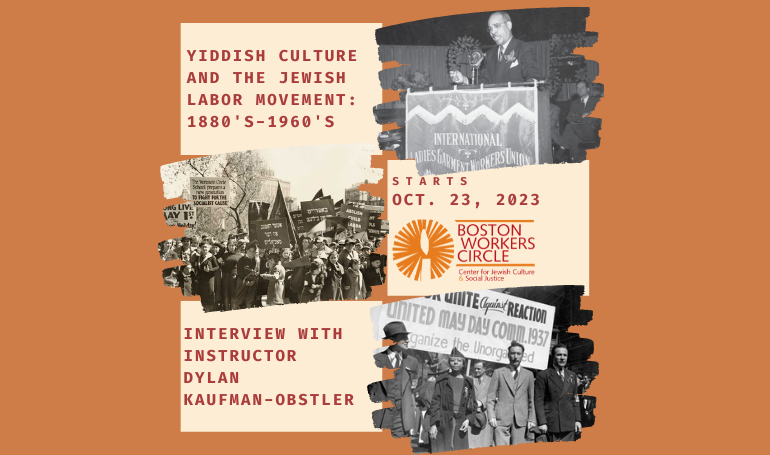
Yiddish Culture and The Jewish Labor Movement: 1880s-1960s
Dylan, we are thrilled that you’ll be teaching our fall adult education course, “Yiddish Culture and the Jewish Labor Movement: 1880s-1960s”! What drew you to studying and teaching on this topic?
It’s wonderful to be teaching this course for the Boston Worker’s Circle because this is where my interest in this topic began! When I was the staff organizer at BWC, I became fascinated by the history of Jewish secularism and the Jewish left. It was a new history to me and it expanded my understanding of Jewish identity and culture. I wanted to study it more thoroughly academically, which is what led me to pursue a Master’s and PhD in History in the topic. To be able to return and offer to this community what I have learned on that journey – the journey it is responsible for sparking in me – is an honor.
This course will examine organizing by Jewish Socialists and Communists between the 1880s and 1960s. What questions or struggles were they confronting during this period?
As much as we live in a quite different political landscape today, I see the struggles and questions of the Jewish left as not so dissimilar from that which confronts us today. Jewish Socialists and Communists in the United States were deeply committed to the struggle for social justice as well as (for quite a number of them) committed to engaging in activism as Jews. The significance of their Jewish identities was at times a dilemma for them as they sought to be part of multi-racial and multi-ethnic movements, but was also a central driver of their activism. They were ultimately fighting for the working-class across racial, ethnic, and national differences, while in the process trying to sustain their own particular culture and sense of identity.
People will have the opportunity to engage with the lesser known history of multi-racial organizing at this time. How do you foresee this being relevant to organizing today?
I believe this history has a great deal to offer us in the present. I use the terms multi-racial, anti-racist, and multicultural to describe the type of work these Jewish activists were engaged in. These are more contemporary terms, not necessarily what these activists used themselves in their time, but they nonetheless are fitting descriptions of what they were up to.
For example, in our third session, we are going to examine the anti-racist organizing of the Communist movement in the 1930s and what this meant for Yiddish cultural work. In that time, the Communist Party was committed to eradicating what they called, “white chauvinism” from its movement. Now, this prompted a lot of discussion on the Jewish left: what were Jews’ responsibility to this issue? Were Jews complicit in “white chauvinism”? Was Yiddish cultural work counter to the movement’s desire to integrate racially? Was the Communist Party’s efforts to publicly shame “white chauvinists” helpful or harmful to its project of combating racism? These were pressing questions for Jewish activists in the Communist movement, and I look forward to engaging with others in the course about what this history may offer us for our contemporary moment as well.
What can participants expect from the format of the course? How do you approach digging into this fascinating history?
I like to work with a combination of activities to make this work as engaging as possible. Each class will begin with a central question that we will aim to answer in that session. I will spend some time each session presenting some historical background and the central events and issues our subjects engaged with in the time period. We will also explore together a number of primary sources (documents from the time period), to see first-hand how these activists were expressing their views in their time and to contemplate together what meaning we take away from these documents. This course will have opportunities for discussion and participation, but quieter types who may prefer a more passive learning experience should also be comfortable. Although we are on Zoom, I am going to treat it like we are learning together in a classroom, with an invitation for us to exchange thoughts, questions, and insights. I believe this will make the course dynamic and personally meaningful. I do ask that people come with cameras and clothes on 😊, ready as one would if we were meeting together in person. I seek to make this course both a valuable learning and community-enriching experience.
About the Instructor
Dylan Kaufman-Obstler, PhD, is thrilled to return to the Boston Worker’s Circle this fall. Her interest in American Jewish History and Yiddish culture began when Dylan was the staff organizer for BWC in 2013-2014. Since her time at BWC, Dylan pursued a Master’s and PhD in History at the University of Wisconsin-Madison, where she studied the history of Jewish Left in the United States. Her dissertation, “Language for a Revolution: Yiddish Schools in the United States and the Making of Jewish Proletarian Culture,” examined the Yiddish Communist School network in the United States and the evolving dynamic between Yiddish culture, American Jewish identity, and Marxist internationalism. Today, Dylan lives in the Eastern Sierra of California, where she teaches U.S. History and Government at Cerro Coso Community College as well as serves as an Adult Education teacher for the Inyo County Office of Education. Dylan looks forward to seeing old and new faces at BWC and engaging in a course that touches something personal in all of us regarding Jewish history, activism, and identity.
